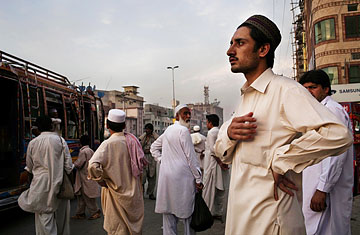
A street scene on GT Road, the route Abdullah Yusuf Azzam is believed to have travelled to his routine Friday prayer at an Arab Mosque in the University Town neighbourhood of Peshawar, in Pakistan
(2 of 3)
But Azzam was also reviled, and feared, for his power to inspire others to share his dedication to jihad. There were no less than five assassination attempts on Azzam in the months leading up to his death, says Hutaifa, and countless threats. In the teeming, faction-ridden streets of Peshawar, they could have been launched by one group or several. "Who didn't want to kill Azzam?" asks journalist Ismail, who worked with Azzam and covered the anti-Soviet resistance throughout the 1980s. He counts the possibilities on his fingers: "There was the KGB and KHAD [the intelligence service of the communist government in Afghanistan] because he was a powerful leader in the jihad. Israel and Mossad, because he helped found Hamas. The [Pakistan] government of Benazir Bhutto, which came to know that he helped instigate a no-confidence vote against her in Parliament." There were the Americans, because Azzam objected to their efforts to reconcile the mujahedin with the Afghan government after the Soviets left; Shi'ite elements in Iran who saw him as chief of the Sunnis; Gulbuddin Hekmatyar, a powerful Afghan warlord who resented Azzam's support of a rival; and other Arabs, who were concerned about his growing power. "The only person I can say for a fact didn't kill him is myself, because I was getting married in Jordan that day," says Ismail.
Barrel-chested, with a long black beard streaked with white, by 1989 Azzam had become a familiar figure on the streets of Peshawar and in the battlefields of Afghanistan, where he was known as the godfather of jihad. Born in Jenin in 1941, Azzam fled to Jordan after Israel captured the West Bank in 1967. He studied at Cairo's Al-Azhar University, then taught at King Abdulaziz University in Jeddah, Saudi Arabia, where he met a quiet, pious student, the son of a rich Saudi construction magnate, who became his patron. Until his death and beyond it, Azzam would be linked to that student — Osama bin Laden.
When the Soviets invaded Afghanistan in 1979, Azzam, who felt humiliated by the occupation of his homeland, found an outlet for his rage. In a 1984 book he advanced a new theory, declaring that religious war to liberate Muslim lands from foreign occupation was compulsory for all Muslims — as important as praying, fasting and tithing. The book galvanized an international Islamist movement, and not long after it was published, Azzam himself moved to Peshawar, the staging area for the anti-Soviet resistance, where he set up the Makhtab al-Khadamat, or Services Bureau, to organize the influx of Arab volunteers. Bin Laden, whose wealth provided the Arab jihadis with plane tickets, housing and expenses, backed him. Together they published Al Jihad magazine, a full-color monthly that glorified battle, denounced the atrocities of the Soviets and asked for donations. But after the Soviets withdrew in 1989, funding for the resistance from the U.S. and Saudi Arabia dried up. In Peshawar, a city crawling with opium smugglers, arms merchants and intelligence agents, jihad had become as much a business as a religious calling. Deprived of a cause, the Arab Afghans argued about where the jihad should go next and squabbled over shrinking resources. Bin Laden, with his deep pockets, was the prize.
Azzam argued for taking the jihad back to Palestine. But a newly radicalized group of Arabs led by the Egyptian doctor Ayman al-Zawahiri was gaining strength. Al-Zawahiri was a takfiri, one of those Muslims who had an extreme belief in the evil of apostasy, and urged the overthrow of Arab regimes such as Egypt's and Saudi Arabia's, which he declared had strayed from the true path. Azzam stuck with the conventional doctrine that Muslims should not kill Muslims. As the embodiment of jihad and bin Laden's mentor, Azzam was hence an obstacle both to al-Zawahiri's ambition to foment Islamic revolution, and to his desire to get bin Laden to fund it.
In the early summer of 1989, as Afghanistan started collapsing into civil war, bin Laden and al-Zawahiri convened a meeting that formalized the establishment of an élite fighting force destined eventually to use terror to achieve its aims. The new recruits, who signed an oath of fealty to bin Laden, eventually became known as al Qaeda, or "the Base," after the camp where they trained. Azzam was appalled, according to his Algerian confidant and later son-in-law Abdullah Anas: "He was against the method of trying to recruit people not for jihad in Afghanistan but for planning to do something else." Al-Zawahiri retaliated by calling Azzam a CIA spy.